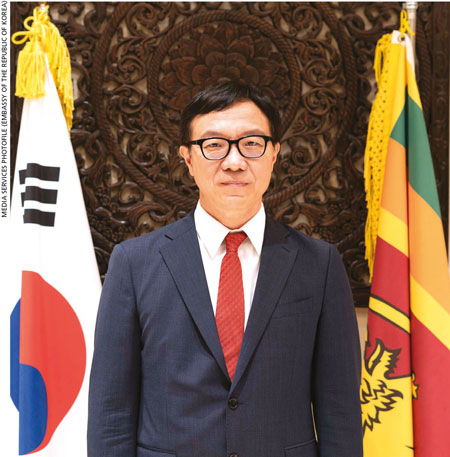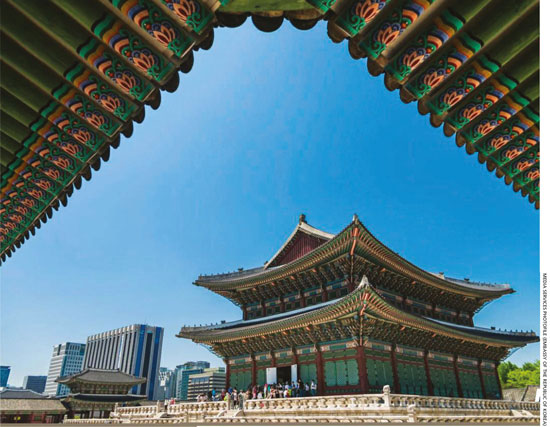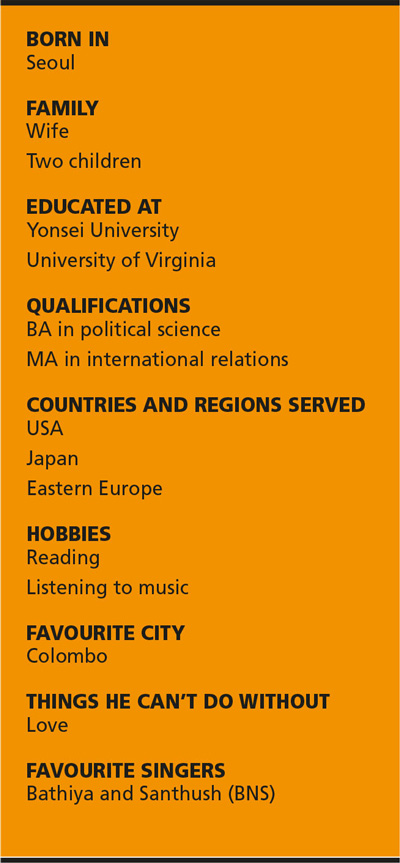DIPLOMATIC MISSION
Compiled by Yamini Sequeira
A NATION LIKE NO OTHER
Why Sri Lanka brings immense happiness to ‘Santhush’ Woonjin Jeong
An ambassador is a conduit to facilitate cooperation between his or her country and the assigned nation. But South Korea’s Ambassador to Sri Lanka Woonjin Jeong has gone a step further and steeped himself in the true essence of Sri Lanka, which is an adoptive home during his tenure here.
Jeong has taken on the Sri Lanka name ‘Santhush,’ which suggests that his stint on the island will be unique. If this gesture does not win hearts in Sri Lanka, nothing will! He explains: “My Korean name ‘Woonjin’ means happiness and when I was seeking an equivalent in Sinhala, I learned that ‘Santhush’ is used to describe happiness.”
“Thereafter, I had the opportunity to meet the Sri Lankan pop duo Bathiya and Santhush, and decided that it’s the most suitable name I can adopt because Sri Lanka brings immense happiness to me. I’d like to carry happiness (‘Santhush’) to Sri Lanka. Please call me Ambassador Santhush Woonjin Jeong,” he adds.
Even as he enjoys the music of his namesake pop star, Jeong was surprised to learn that many Sri Lankans enjoy K-dramas and K-pop.
“I realise now that Sri Lankan music is similar to a popular genre of Korean music called ‘trot song’ with a similar rhythm. It would be great to bring the two countries’ music, theatre and cinema closer together,” he muses.
Interestingly, the two cultures have many common elements.
In South Korea, traditional elements of holiday celebrations include the formal and respectful greeting of elders, the preparation and consumption of special foods such as certain rice cakes (ddŏk in South Korea and kiribath in Sri Lanka), and wearing traditional dress.
One of the oldest forms of Korean dance and theatre performance is the masked dance similar to what’s in Sri Lanka.
Since his arrival on the island in July last year, the ambassador has endeared himself to the Sri Lankan people. Moreover, he emphasises that his impression of Sri Lanka and its people is similarly positive, and perceives more scope for greater cooperation between the two nations.
He avers: “Given the huge op portunities offered by the rising Sri Lankan economy, and the talent of the Korean and Sri Lankan people, the scope for beneficial collaboration is infinite.
portunities offered by the rising Sri Lankan economy, and the talent of the Korean and Sri Lankan people, the scope for beneficial collaboration is infinite.
“Sri Lanka is a hub for smart and high quality human resources, and rich natural resources, which complement the state-of-the-art technology and capital available in South Korea. This combination creates the perfect synergy for our two countries to further business potential,” Jeong posits.
The two nations have enjoyed mutually beneficial diplomatic relations since the 1970s and over the decades, have achieved many milestones in culture, trade, investment and commerce. South Korea was the largest distributor of foreign direct investment (FDI) in Sri Lanka in the decade from 1980 to 1990.
“In my capacity as ambassador, I urge Korean investors to explore more opportunities in Sri Lanka especially in sectors such as agriculture, renewable energy, LNG, infrastructure and digital economy,” he states.
The ambassador adds: “When it comes to Sri Lankan exports to South Korea such as apparel, leather products, fabric and agricultural items, they make a major contribution to the South Korean economy. Sri Lankan tea is also very popular among Koreans for its high quality and distinct taste.”
Jeong points out that Sri Lanka is among South Korea’s priority official development assistance (ODA) cooperation partner countries and also one of the top five nations to benefit from its Economic Development Cooperation Fund (EDCF). The investment in various ODA projects and grants benefitting Sri Lanka since 1987 exceeds US$ 1 billion.
The Sri Lanka office of the Korea International Cooperation Agency (KOICA) has assisted and funded projects in education, transportation, water resources, sanitation and regional development.
Engagement in labour cooperation has also been impressive in recent years with 23,000 Sri Lankan employees presently working in South Korea. They remitted some 520 million dollars to Sri Lanka in 2019.
Tourism is another area of cooperation that could bring the two countries closer together with Jeong enthusing that “in 2018, around 16,000 South Koreans visited Sri Lanka and 12,200 in 2019. Once the borders reopen, I’m confident that more Korean tourists will visit to enjoy the charm and beauty of the island since Sri Lanka was ranked by Lonely Planet as the top country to visit.”
“South Korea’s economic miracle – known as ‘The Miracle on the Han River’ – is about the Korean people and how they overcame many hardships to achieve a national transformation from poverty to prosperity. I strongly believe that Sri Lanka too will be transformed given the right direction,” he says.
And the ambassador declares: “I feel that South Korea is the ideal country to help Sri Lanka achieve the goals it has envisioned for national development.”
In conclusion, he notes that “the foreign policy of Sri Lanka has been designed to foresee and grasp the opportunities of a changing world. The Asia-centric foreign policy of Sri Lanka is in harmony with Seoul’s ‘New Southern policy.’ South Korea is a true and reliable friend of Sri Lanka, and will continue to stand by Sri Lankans in their journey to achieve national development goals.”



